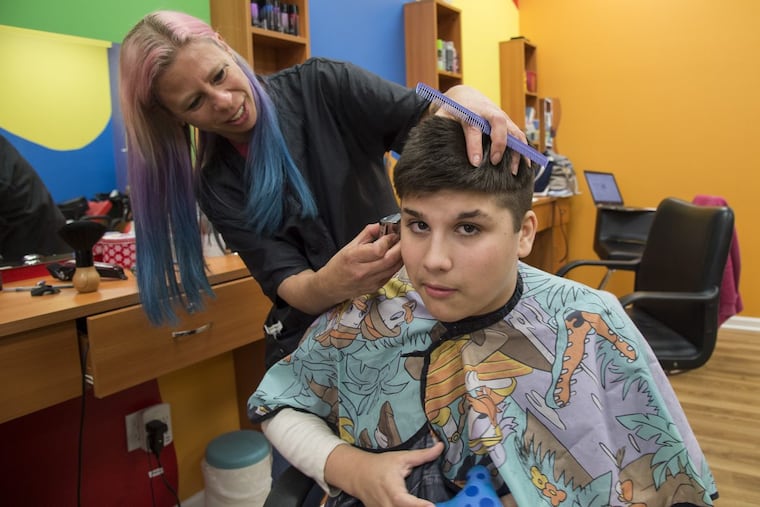Training programs help professionals meet autistic children's everyday needs
While researchers focus on the causes of autism and why it has become so prevalent, efforts also are underway to educate hairdressers, eye doctors and more to help these children.

As hair stylist Kira Ferguson buzzed his head with clippers, Sean Smith, of Philadelphia, reached for M&Ms his mother offered as she sat nearby. He fiddled with a vibrating massager while the stylist trimmed his locks.
Sean, a tall, handsome 11-year-old with thick, dark hair, has autism.
"Sometimes I have to feed him M&Ms to try to keep him calm," said Anna Maria Smith, Sean's mother.
At Wiggle Worms Children's Hair Studio in Feasterville, Ferguson, the owner, and her staff give haircuts to up to 10 autistic children a day.
The salon is one of a growing number of services that cater to the everyday needs of autistic children. In recent years, Ferguson and other professionals have turned to parents and people in the autistic community to learn how to help those with autism, and are sharing their knowledge with others in their professions.
Most children outgrow their fear of haircuts as toddlers. But for autistic kids, the dread of a stranger armed with scissors and a noisy hair dryer may not fade as easily. They may also fear going to a dentist or eye doctor or being on a crowded bus or at a busy airport.
Autism is a developmental disability that causes problems with social, emotional, and communication skills. According to the Centers for Disease Control and Prevention, autistic children and adults may have increased sensitivity to light, sound, or smell, coupled with hyperactivity or repetitive behaviors and a tendency to avoid other people.
The Pennsylvania ASERT (Autism Services, Education, Resources and Training) program states that, as of 2011, 10,727 people, both adults and children, were receiving state services for autism in the five counties of Southeastern Pennsylvania. That number has almost doubled since 2005. In New Jersey, the Department of Health reports 25,000 people from birth to age 21 on a state registry designed to promote research and provide support for affected families. In 2012, the number was 8,867.
Researchers believe the increase could be due in part to a growing awareness and an expanded definition of the disorder.
At Wiggle Worms, Ferguson lets autistic children play with a massaging tool that mimics the feeling of the clippers that will be used on their heads.
"It's a distraction," said Ferguson, 44, who shares her techniques with other stylists.
"We use very quiet clippers," said stylist Colleen Tomczak.
At the Bucks County Technical School in Bristol Township, cosmetology teacher Brandee Baker advises students, "to speak very calmly … and keep the directions simple" when working with autistic clients.
Other tips include wetting a comb rather than spraying the child's head with water. Word choice is important, too.
"When you say 'cut' with little kids, they think of hurting and blood, so say 'trim,'" Baker said.
She also suggested that autistic children see the same stylist for each visit, if possible, to help them develop a rapport with the person.
Maria Velasco, of the University of Pennsylvania School of Dental Medicine, stressed talking in words that children understand. When an autistic girl needed an X-ray in a machine that circled her head, Velasco told her to imagine being on a space ship.
"Many [autistic children] don't get vision screenings because providers are not trained on how to interact and manage their sensory differences," said Roseann Schaaf, chair of the occupational therapy department at Thomas Jefferson University in Philadelphia.
Jefferson is leading a program that trains medical students at Jefferson and Wills Eye Hospital on the subtleties of caring for an autistic patient. For example, when children need eye drops, they should be allowed to feel the drops on their hands first, she said.
The Center for Autism Research at the Children's Hospital of Philadelphia (CHOP) also hosts or sponsors training programs for professionals, retailers, and community groups.
"It's a growing area of interest as the rates [of autism] are increasing," said Judith Miller, a psychologist at CHOP.
ASERT and the Philadelphia Autism Project – a joint endeavor of City Council, the city Department of Behavioral Health and Intellectual Disability Services, and the Drexel Autism Institute at Drexel University — are educating Philadelphia police officers, firefighters, other first responders, and juvenile justice and child welfare workers on how to identify and assist an autistic person.
A similar program, called the Autism Shield Project, was created in New Jersey by the nonprofit Parents of Autistic Children. It also trains school bus drivers. In addition, several state government departments have formed an Interdepartmental task force to publish a directory of resources regarding autism.
SEPTA has developed and is now expanding a training facility in the concourse of Suburban Station, where those with special needs can practice riding buses and other public transportation in a more calming environment. The center is under renovation but expected to reopen by the end of this year.
"Travel training is one of the best investments we can make," said SEPTA spokeswoman Kristin Mestre-Velez. "Accessible vehicles and facilities are wonderful but only if people know how to use them."
Autism Speaks, a national advocacy group, is also a good resource to find localized autism-friendly services.
Some YMCAs and Jewish Community Centers provide swim lessons to autistic children, said Lisa Goring, chief program and marketing officer for Autism Speaks.
"Many children with autism are drawn to water," Goring said. "It's so important the children know how to swim."
As more autistic children enter adulthood, a survey by the Pennsylvania Autism Needs Assessment has found that fewer than 25 percent participate in community activities and more than two-thirds are unemployed. The services offered by those like Ferguson and the training now available to help both professionals and the public understand autistic youths and their special needs may improve those statistics.